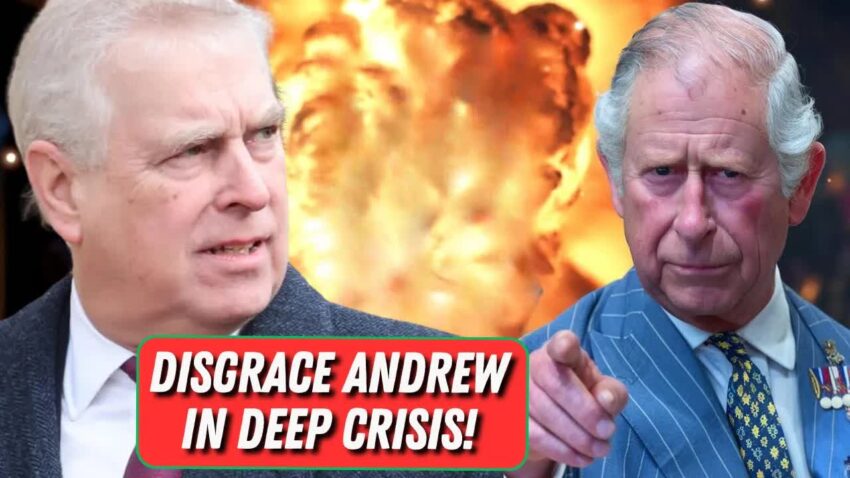In the latest chapter of royal family drama, Prince Andrew is once again at the center of controversy, much to the chagrin of King Charles III.
As the monarchy strives to modernize and adapt to contemporary expectations, Andrew’s actions seem to fly in the face of his brother’s efforts.
It’s a situation that has many shaking their heads in disbelief.
What could possess Prince Andrew to claim he has found mysterious international trade contacts to sustain his lavish lifestyle in a 30-bedroom mansion?
This audacity is particularly striking when you consider the embarrassment he has already brought upon the royal family.
While King Charles works diligently to streamline the monarchy, Andrew appears to be thumbing his nose at these efforts, highlighting a stark contrast between duty and entitlement.
In the realm of royal responsibilities, Prince William and Princess Catherine are setting an exemplary standard.
They manage their lives with grace in a modest Adelaide cottage, focusing on their service to the nation rather than the size of their residence.
It begs the question: what does it say about Andrew that he needs such an extravagant space for just two people?
The irony is palpable when Andrew claims to have secured new sources of income.
After being stripped of his royal duties due to scandal, can we really believe he has suddenly morphed into an international business mogul?
It feels a bit like a teenager insisting they have a girlfriend from another school—hardly credible.
King Charles is making tough decisions aimed at modernizing the monarchy and ensuring it remains relevant.
Instead of supporting this vision, Andrew behaves like a recalcitrant adolescent, refusing to accept that his role has fundamentally changed.
Once a working royal, he now seems more interested in maintaining a lifestyle that no longer aligns with his current status.
The parallels between Andrew’s behavior and that of the Sussexes are striking.
Both appear to operate from a playbook of entitlement that disregards the principles of duty and service.
Andrew’s claim about international trade contacts raises eyebrows—who are these supposed partners willing to fund his luxurious lifestyle?
It’s hard to shake the feeling that these connections could lead to more trouble than triumph.
Then there’s the issue of the Royal Lodge itself.
With all those bedrooms, one might think it would be a palace of dreams, but instead, it’s become a burden.
If Andrew truly cannot afford the upkeep, wouldn’t it make sense to downsize?
It’s a classic case of someone living beyond their means, yet he remains stubbornly attached to a property that is clearly too grand for his current circumstances.
Meanwhile, while William and Catherine work tirelessly to promote a positive image of the monarchy, Andrew’s antics threaten to overshadow their efforts.
The stark contrast between their dedication and his self-serving behavior couldn’t be more pronounced.
And let’s not forget that King Charles has cut off Andrew’s generous allowance—a bold move that finally holds him accountable.
The timing of Andrew’s latest antics is particularly curious.
As the monarchy grapples with various challenges, including Catherine’s recovery, Andrew decides to stir the pot even further.
It’s almost as if he thrives on drama, drawing attention away from the real issues facing the royal family.
Speaking of the royal residences, Andrew’s decision to sign a 75-year lease on a property is baffling.
These homes aren’t heirlooms to be passed down; they are meant to serve the crown.
His insistence on maintaining a lifestyle that is no longer feasible is reminiscent of someone who refuses to grow up, clinging to the past while the world moves on.
As King Charles navigates the complexities of his role, he faces the added challenge of a brother who seems determined to undermine his authority.
This situation is not just outrageous; it’s a test of familial loyalty and responsibility.
Wouldn’t it be refreshing if Andrew took a cue from William and Catherine, embracing the spirit of public service instead of self-indulgence?
While the drama unfolds, it’s crucial to recognize the true royals—those who embody dignity, service, and commitment to their roles.
William, Catherine, King Charles, and Queen Camilla continue to exemplify what modern royalty should represent.
Their efforts deserve our support, especially as they strive to elevate the monarchy in the eyes of the public.
As we watch this royal saga develop, it’s clear that some family members are more interested in chaos than in contributing positively to the institution.
The contrast is stark and serves as a reminder of the values that truly matter in royal life.
So, let’s keep our focus on those who understand the meaning of service and support them as they navigate the complexities of royal duty.
